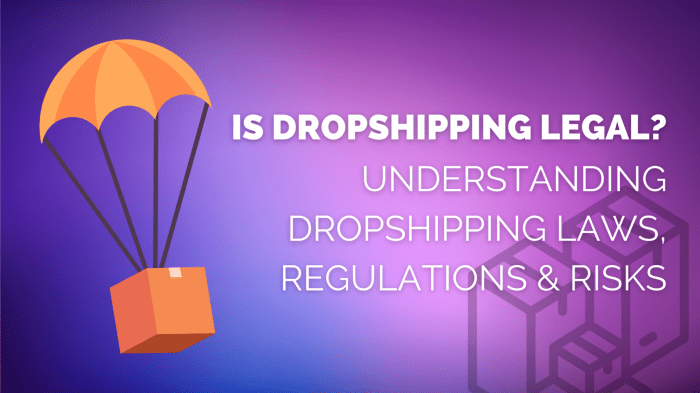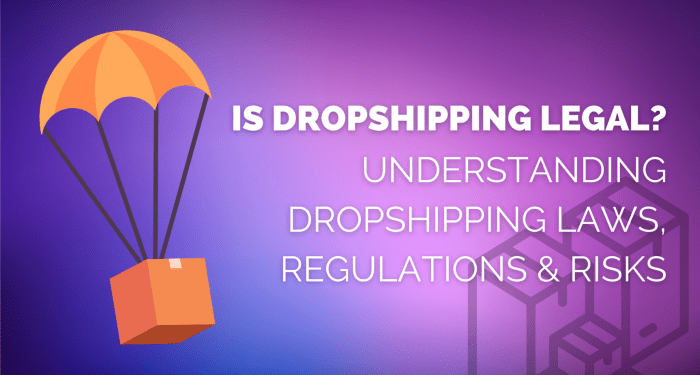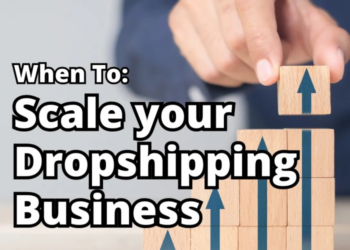Embark on a journey through the legal requirements for dropshipping in Europe, unraveling the complexities of regulations that govern this business model. This overview will shed light on the key aspects that every dropshipper should consider.
Legal requirements for dropshipping in Europe
Dropshipping in Europe is subject to a variety of legal requirements to ensure consumer protection, product safety, and fair business practices.
General Legal Framework
In Europe, dropshipping businesses must comply with the laws and regulations of each individual country where they operate. The European Union also has specific regulations that may apply to cross-border dropshipping activities.
Key Regulations
- Distance Selling Regulations: Dropshippers must adhere to distance selling regulations which govern online sales, including providing clear information to consumers, the right to cancel orders, and refund policies.
- Consumer Protection Laws: Dropshipping businesses are required to ensure that products sold comply with consumer protection laws, including accurate product descriptions, safety standards, and fair pricing practices.
- Data Protection Regulations: Dropshippers must comply with data protection laws such as the General Data Protection Regulation (GDPR) when handling customer data.
Product Safety and Consumer Protection
Dropshipping businesses in Europe must ensure that products meet safety standards and do not pose a risk to consumers. They are also required to provide accurate product information, including ingredients, materials, and any potential hazards.
VAT and customs duties
When it comes to dropshipping in Europe, understanding VAT and customs duties is crucial to ensure compliance with the regulations. Here, we will detail the VAT implications for dropshipping, discuss how dropshippers can navigate customs duties when selling products across European borders, and provide examples of how to comply with VAT requirements in different European countries.
VAT Implications for Dropshipping
- Dropshippers need to be aware of the VAT thresholds in different European countries. Once the threshold is exceeded, they must register for VAT in that specific country.
- It is important to correctly charge and collect VAT on products sold to customers within the EU. Failure to do so can result in penalties and legal issues.
- Dropshippers should keep detailed records of their sales and VAT payments to ensure compliance with tax authorities.
Customs Duties Navigation
- Dropshippers need to understand the customs duties and import taxes applicable to products being sold across European borders.
- Utilizing a reliable customs broker can help navigate the complexities of customs duties and ensure smooth delivery of products to customers.
- Properly declaring the value of goods and providing accurate documentation is essential to avoid delays or additional costs at customs.
Compliance with VAT Requirements in Different European Countries
- In countries like Germany, dropshippers need to register for VAT if their annual sales exceed a certain threshold, currently set at €22,000.
- In the UK, dropshippers must register for VAT if their sales exceed £85,000 in a 12-month period.
- In France, dropshippers need to charge VAT at the standard rate of 20% on most products sold to customers within the country.
Consumer rights and data protection

Consumer rights play a crucial role in ensuring that dropshipping businesses operate ethically and responsibly in Europe. Additionally, data protection regulations, such as GDPR, are essential for safeguarding customers' personal information and maintaining trust in dropshipping operations.
Consumer Rights in Europe
- Consumers have the right to clear and accurate information about the products or services being offered through dropshipping.
- Customers should be informed about their right to withdraw from a purchase within a certain period, commonly known as the cooling-off period.
- Dropshipping businesses must ensure that products meet quality standards and are as described on their websites.
- Consumers should have access to a transparent and easy returns process in case they are not satisfied with the product.
Data Protection Regulations (GDPR)
- GDPR requires dropshipping businesses to obtain explicit consent from customers before collecting and processing their personal data.
- Businesses must ensure that customers' data is securely stored and protected from unauthorized access or breaches.
- Customers have the right to request access to their personal data, as well as the right to have their data deleted if they no longer wish for it to be retained.
- Dropshipping businesses must appoint a Data Protection Officer (DPO) to oversee compliance with GDPR requirements.
Ensuring Compliance
- Regularly review and update privacy policies and terms of service to reflect any changes in consumer rights and data protection regulations.
- Provide clear information to customers about how their data will be used and stored, ensuring transparency and trust.
- Implement robust security measures to protect customer data, such as encryption and secure payment gateways.
- Educate staff members about consumer rights and data protection laws to ensure compliance at all levels of the business.
Supplier agreements and contracts
Supplier agreements and contracts play a crucial role in the success of a dropshipping business in Europe. These formal agreements help establish clear expectations and protect the interests of both the dropshipper and the supplier.
Importance of formal supplier agreements
Formal supplier agreements provide a legal framework for the business relationship between the dropshipper and the supplier. They Artikel the terms and conditions of the partnership, including pricing, payment terms, shipping arrangements, product quality standards, and dispute resolution mechanisms.
Key clauses in supplier contracts
- Product specifications: Clearly define the products to be supplied, including quality standards, packaging requirements, and any customization options.
- Pricing and payment terms: Specify the pricing structure, payment terms, and any applicable fees or penalties for late payments.
- Shipping and delivery terms: Artikel the shipping methods, delivery times, and responsibilities of each party regarding shipping costs and customs clearance.
- Intellectual property rights: Address issues related to trademarks, copyrights, and proprietary information to prevent unauthorized use or reproduction of products.
- Confidentiality and non-disclosure: Include clauses to protect sensitive business information and trade secrets from being shared with competitors or third parties.
Best practices for negotiating and drafting supplier agreements
- Conduct thorough research on potential suppliers to ensure their reliability and reputation in the industry.
- Negotiate favorable terms that align with your business goals and long-term sustainability.
- Seek legal advice to review and finalize the supplier agreements to ensure compliance with European laws and regulations.
- Maintain open communication with suppliers to address any issues or concerns promptly and avoid misunderstandings.
Wrap-Up
In conclusion, understanding and complying with the legal requirements for dropshipping in Europe is crucial for a successful and sustainable business. By staying informed and adhering to the regulations, you can navigate the European market with confidence and integrity.
Answers to Common Questions
What are the general legal frameworks for dropshipping in Europe?
The general legal framework in Europe includes regulations related to product safety, consumer protection, VAT, customs duties, and data protection.
How can dropshippers comply with VAT requirements in different European countries?
Dropshippers can comply with VAT requirements by registering for VAT in each country they operate in and charging the appropriate VAT rates on sales.
What are some key clauses that should be included in supplier contracts for dropshipping businesses?
Key clauses in supplier contracts should cover issues such as product quality, delivery times, returns, liability, and termination conditions.













